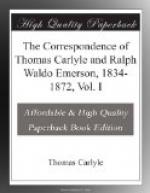------------ * In the first edition of this Correspondence a portion of this letter was printed from a rough draft, such as Emerson was accustomed to make of his letters to Carlyle. I owe the original to the kindness of the editor of the Athenaeum, in the pages of which it was printed. -----------
I went to the Athenaeum, and procured the Frasers’ and will print the Novelle and the Mahrchen at the end of the Fourth Volume, which has been loitering under one workman for a week or two past, awaiting this arrival. Now we will finish at once. Cruthers and Jonson I read gladly. It is indispensable to such as would see the fountains of Nile: but I incline to what seems your opinion, that it will be better in the final edition of your Works than in this present First Collection of them. I believe I could find more matter now of yours if we should be pinched again. The Cat-Raphael? and Mirabeau and Macaulay? Stearns Wheeler is very faithful in his loving labor,—has taken a world of pains with the sweetest smile. We are very fortunate in having him to friend.—For the Miscellanies once more, the two boxes containing two hundred and sixty copies of the first series went to sea in the “St. James,” Captain Sebor, addressed to Mr. Fraser. (I hope rightly addressed; yet I saw a memorandum at Munroe’s in which he was named John Fraser.)
Arthur Buller has my hearty thanks for his good and true witnessing. And now that our old advice is indorsed by John Bull himself, you will believe and come. Nothing can be better. As soon as the lectures are over, let the trunks be packed. Only my wife and my blessed sister dear—Elizabeth Hoar, betrothed in better times to my brother Charles,—my wife and this lovely nun do say that Mrs. Carlyle must come hither also; that it will make her strong, and lengthen her days on the earth, and cheer theirs also. Come, and make a home with me; and let us make a truth that is better than dreams. From this farm-house of mine you shall sally forth as God shall invite you, and “lecture in the great cities.” You shall do it by proclamation of your own, or by the mediation of a committee, which will readily be found. Wife, mother, and sister shall nurse thy wife meantime, and you shall bring your republican laurels home so fast that she shall not sigh for the Old England. Eyes here do sparkle at the very thought. And my little placid Musketaquid River looked gayer today in the sun. In very sooth and love, my friend, I shall look for you in August. If aught that we know not must forbid your wife at present, you will still come. In October, you shall lecture in Boston; in November, in New York; in December, in Philadelphia; in January, in Washington. I can show you three or four great natures, as yet unsung by Harriet Martineau or Anna Jameson, that content the heart and provoke the mind. And for yourself, you shall be as cynical and headstrong and fantastical as you can be.




